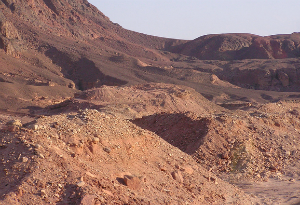The wilderness experience
As Lent approaches many Christians will consider again the temptations of Jesus in the wilderness of Judea. John Rackley wonders about the significance of wild places for our spirituality and faith.
 What does a wild place look like to you? Maybe you are thinking of exotic areas like the Antarctic or the Himalayas. You may come closer to home and be remembering a holiday in the Scottish Highlands or a walk to the centre of Dartmoor.
What does a wild place look like to you? Maybe you are thinking of exotic areas like the Antarctic or the Himalayas. You may come closer to home and be remembering a holiday in the Scottish Highlands or a walk to the centre of Dartmoor.
The surface of the moon looks pretty wild doesn’t it? So does the Sahara from the air.
There is a clear link between wild places and the spirituality of the bible. It is full of stories about the impact of desert landscapes and the faith of people who travel there.
Sometimes we might say that our prayer life is dry and barren like a wilderness. Well not all wild places are dry but what I believe we are describing is a sense of absence that is common to all. There is sparseness about wild places. They are not refined. They can be quite brutal in their impact especially if we are not used to them.
Yet paradoxically that very emptiness can lead us to discover what we count as important and what is crucial for our well-being.
Such an experience of wildness in our prayer may in the end produce a deeper more convinced trust in the God to whom we pray and a stronger sense of conviction and priorities.
Travelling through a wild place one has to be careful both over what you wear and what you carry. There is no room for clutter or over-packing. De-cluttering of the mind and our living-space has become a popular Lenten aspiration in recent years.
Indeed we see Jesus on a demanding fast whilst he seeks out the nature of his ministry. There could be no distractions; no excess baggage or accessories.
He practiced the simple trust that he would draw out in his followers. The wilderness was part of his formation as a minister of God’s Kingdom. He endured an intense formation. There were no frills, no compensation just a straightforward loyalty to his father in heaven.
He would need it.
Wild places are often an encounter with ancient pathways both metaphorical and real. C V Morton used to say that in mountain country there is nothing older than a road. Cities may come and go, the most splendid buildings may live and die but the little road that runs between the rocks lives forever.
This reminds me of the sheep runs down over the combes dropping into Bath. They are still there, the market has gone. I have walked some of the ancient tracks across what used to be called Dartmoor forest linking various places of worship and trade. They would have been very different in the midst of dense woodland.
The greatest surprise was to walk through a valley in the Sinai to be told that the apparently empty wadi was in fact one of the spice trade routes stretching all the way to China.
The prophet Jeremiah told his frightened fellow Israelites to stand at the crossroads and look in all directions and seek out the ancient paths, find the good path, walk in it and they would find rest for their souls. Surely Jesus had this in mind when he too offered rest to the over-taxed and religiously burdened people of his time.
Both the prophet and the Saviour were valuing ancient wisdom; the old pathways. It is a cause of relief and excitement that tried and tested ways of prayer are now being encouraged in our churches. For one of the toxic sins of both our society and our churches is the belief that anything thought of or done more than a generation ago has no value for the present.
Recently I viewed one of Wales’s wild places from a distance. I was travelling east on the A40 when into view came the glory of Pen-y-fan, its flanks washed in snow standing anvil-like against a blue sky.
I longed to be there. My eyes did look to the hills as the Psalmist suggests. But not in fear of attack but rather with exhilaration and longing for I knew what I was looking at was the relic of a mountain that once was much higher but had long been washed into the valleys below.
Maybe that is why there is a melancholy in wild places. They are hints of past glory. They attract by their beauty and strangeness but also because they were once something else. And in their winds and eye-stretching vistas we little people are put in our place and invited to be still, to receive, to shut up and be given the blessing of the God who has seen it all before and welcomes us to his side and then walks with us a path of our choosing.
John Rackley is Baptist minister living Leicestershire. He continues this theme in his blog www.windingquest.wordpress.com based on time he spent in the Sinai desert.
Picture: Sinai/RGB Stock
Baptist Times, 15/02/2015